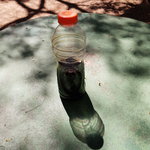I haven't listened to all of them but the general overview is that Ryan worked with some organic soil consultants who were having excellent results pretty much across the board. They did an analysis of the soil in his pots and came up with a regime which included compost teas.
The health of his trees went downhill quickly - particularly in the trees with the finest roots. It sounds like there was quite noticeable and significant damage. The takeaway from the past two podcasts (post failed experiment) is that soil in bonsai pots has a very different set of characteristics and that dumping a huge amount of bacteria (which compost tea contains) into that environment is a risky proposition. One suggestion was that in the bonsai environment the bacteria may have gone crazy and consumed all the available carbon which had a range of impacts including causing the pH to drop massively.
The guy in the latest podcast manages aquacultural systems as a job and does bonsai as a hobby. He was critical of the approach the consultant had suggested and instead suggests that worm castings are used as an organic compost/soil addition. In his job he's responsible for managing a complex bacterial/chemical environment and he made a good case that worm castings are much more stable and less risky than other organic biological ameliorants.
The podcasts are incredibly interesting and I'm thrilled to see this level of conversation going on in bonsai. I've had a fair amount to do with organic and conventional horticulture and I've been trying to wrap my head around what does and doesn't apply to the bonsai pot. These podcasts have been really useful in this.
Edit - I was half listening to the podcast while working around the house so I may have gotten some details wrong.
The podcasts are available here:
Bonsai Mirai is a company, a place, a practice, an ecosystem of creators. This is our outlet for discussion of all things bonsai and beyond....

bonsaimirai.podbean.com


